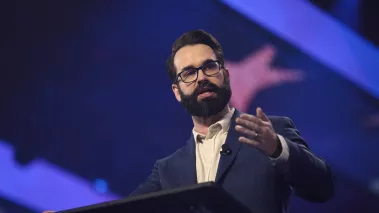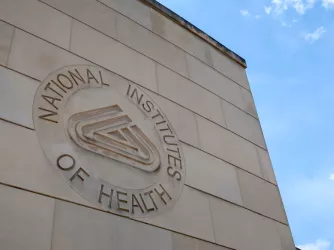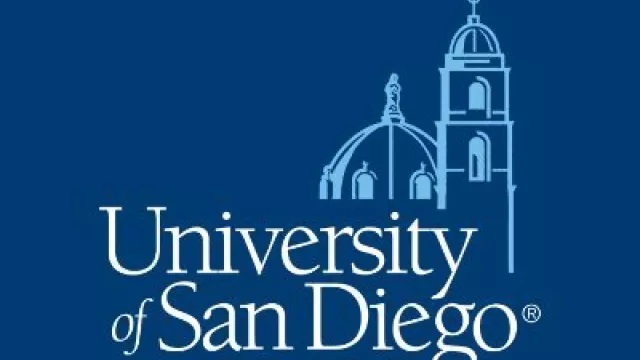Table of Contents
University of San Diego allows students to invite speakers, but only if no one is offended

Gage Skidmore / Wikimedia Commons
Matt Walsh speaking with attendees at the 2022 AmericaFest at the Phoenix Convention Center in Phoenix, Arizona.
A new semester brings the same free speech issues, this time at the University of San Diego, where administrators rejected a request by the College Republicans to host political commentator Matt Walsh because of the potential for students to feel “not comfortable.”
This infantilizing censorship cannot stand at a university that promises students the right to host controversial speakers who will spark robust campus discussions.
When the group first sought to bring Walsh to campus, administrators rejected the request. Why? Director of Student Activities and Involvement Jennifer Lee told the group on July 13 that she believes Walsh’s views are “transphobic,” “offensive,” and would make USD students feel “unsafe,” “not comfortable,” and “offended and hurt.”
Then, on Aug. 2, Vice President for Student Life Byron Howlett claimed USD “is in full support of freedom of expression, freedom of inquiry” as “that’s the basis of a university” — but he still said the College Republicans can’t host Walsh because his views are “very disrespectful” and “grossly offensive.”
But what of USD’s promises to students that it is “committed to creating and maintaining an environment in which a variety of ideas can be reasonably expressed, discussed and critically examined”? USD policies require administrators not only to allow but to encourage students to host thought-provoking speakers as “part of its effort to help members of the university community make informed and responsible decisions in the political, social, professional and personal aspects of their lives.”
USD may be guided by a misplaced belief that it’s protecting students by preventing them from hearing Walsh, but doing so makes them no wiser, safer, or better prepared for life in our pluralistic society.
The policy even clarifies that student “sponsorship of a guest speaker does not imply that either the university or the sponsoring organization approves or endorses the views expressed by the guest speaker.” USD further promises that its “control of campus facilities will not be used as a device of censorship.”
Private universities that promise free speech must deliver, even when it is difficult or unpopular to do so. There is no exception for speakers who may offend students, administrators, or society at large. On a college campus dedicated to the free exchange of ideas, one would be hard-pressed to find an opinion or position that is not controversial to someone. If USD were to deny every student group’s speaker request because some oppose the speaker’s views or beliefs, there would be precious few individuals allowed to address the student body.
USD may be guided by a misplaced belief that it’s protecting students by preventing them from hearing Walsh, but doing so makes them no wiser, safer, or better prepared for life in our pluralistic society. That’s why university policy rightly empowers students to host a wide array of speakers so that their views may be “reasonably expressed, discussed and critically examined” by students in an educational environment. Rather than shielding students from potentially uncomfortable ideas, as if they are children incapable of participating in academic debate, USD should help students develop their ability to think critically and independently about the world around them.
FIRE’s Sept. 6 letter to USD calls on the university to uphold its laudable commitment to free speech by letting the College Republicans host Walsh — and to allow its predominantly adult student body to confront views with which they may not agree.
As we state in our letter, “The principle of freedom of speech does not exist to protect only non-controversial expression; it exists precisely to protect speech that some members of a community may find controversial or offensive.” We accordingly requested that USD approve the group’s speaker request by Sept. 20.
Students, of course, should be free to listen to Walsh, host their own speaker, or simply ignore the event. FIRE calls on USD to afford students this choice.
FIRE defends the rights of students and faculty members — no matter their views — at public and private universities and colleges in the United States. If you are a student or a faculty member facing investigation or punishment for your speech, submit your case to FIRE today. If you’re a faculty member at a public college or university, call the Faculty Legal Defense Fund 24-hour hotline at 254-500-FLDF (3533). If you’re a college journalist facing censorship or a media law question, call the Student Press Freedom Initiative 24-hour hotline at 717-734-SPFI (7734).
Recent Articles
FIRE’s award-winning Newsdesk covers the free speech news you need to stay informed.

Maine’s censure of lawmaker for post about trans student-athlete is an attack on free speech

Trump’s border czar is wrong about AOC

FIRE calls out 60 Minutes investigation as 'political stunt' in comment to FCC



